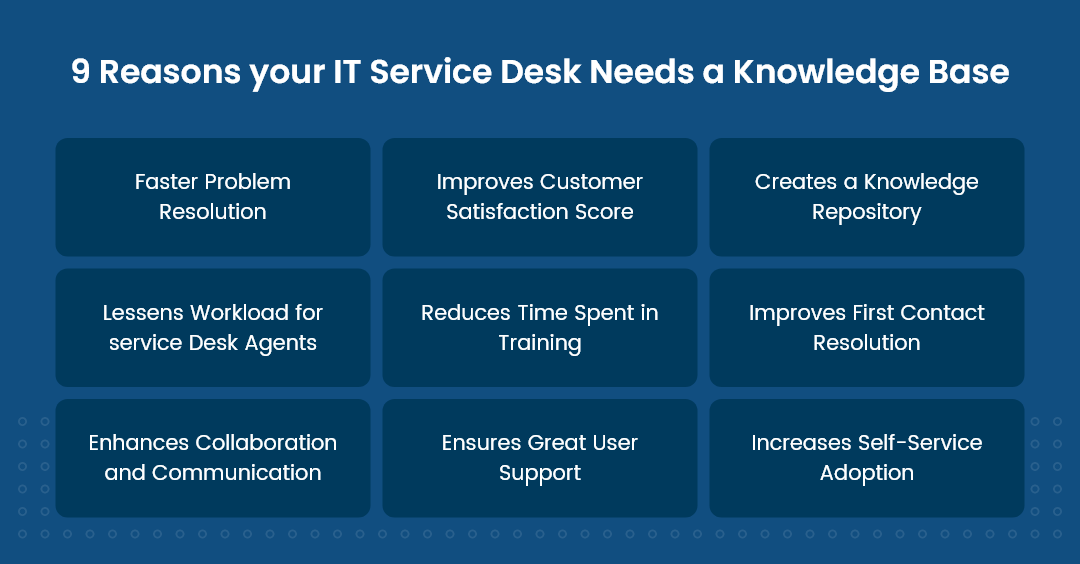It’s no surprise that a knowledge base is imperative for an IT service desk.
Without a knowledge base, enterprises face issues like –
- Difficulty in providing consistent support
- Ineffective and lengthy problem resolution
- Long support cycles
- Knowledge silos
- Reduced productivity & more
In today’s evolving world, people seek fast access to accurate information.
Instead of contacting technical support, users prefer to conduct independent research and quickly solve their fundamental issues – this is when the knowledge base comes into the picture.
Let’s dive deeper into the concept of knowledge base and know why it’s essential for an IT service desk.
As the name suggests, a knowledge base holds knowledge in articles.
It is a centralized repository of information that empowers users to find precise answers to their questions quickly.
By offering a streamlined and convenient process for information access, a knowledge base reduces the need for customer support and enhances user satisfaction.
At Motadata, our knowledge base also provides a FAQ format and the article. Articles and FAQs help requesters to solve their issues on their own.
These documents are also accessible by the technicians so they can use them in their daily troubleshooting.
Here’s an interesting prediction by Gartner:
“By 2020, customers will manage 85% of the relationship with the enterprise without interacting with a human.” [Gartner]
If you are still unsure about implementing knowledge management, here’s a compiled list of 9 reasons to adopt one.
Why is a knowledge base important for IT service desks?
Reason 1: Faster problem resolution
Since a knowledge base is a single source of documented solutions and best practices it enables quick access to relevant information.
So, users can get their problems resolved faster. Some other reasons through which problems can be resolved faster are:
- Easy information retrieval: User-friendly interfaces and well-structured knowledge bases facilitate quick search and retrieval of required knowledge.
- Lessons learned documentation: Analyzing past resolutions and capturing lessons learned helps avoid repeating mistakes and apply proven solutions promptly.
- Continuous improvement: Employees contribute insights and suggestions, enhancing the knowledge base and optimizing problem resolution over time.
- Automation & self-service: Integration with automation and self-service portals empowers users to find solutions independently, reducing reliance on support teams.
Reason 2: Improves customer satisfaction score
A knowledge base facilitates self-service for requesters coming to the customer portal (part of the help desk).
In Motadata ITSM, a requester, who has landed on the customer portal, can search for articles and FAQs using the search bar; this way, the requester gets the necessary information to resolve his/her issue without calling or filling out a ticket.
Having a knowledge base help tackle fewer pressing issues like ‘How to reset one’s password’, ‘Where do I get my tax forms, etc.
When such problems are handled, technicians can focus their time and effort on high-priority issues.
This way, low and high-priority issues are resolved in time, resulting in higher CSAT scores.
Reason 3: Creates a knowledge repository
The IT service desk of every organization has at least one IT hero.
An IT hero has the hack to almost all the problems or knows someone who can get the job done.
These people are wonderful to have, but they can be a bottleneck too. There’s no way to share their knowledge in a scenario without a knowledge base.
Most troubling tickets get redirected to IT heroes, thus, over-burdening them and affecting their capacity to resolve the tickets on time.
And if an IT hero decides to leave the organization, their knowledge is lost forever.
A knowledge base provides a system and incentive for IT heroes to share knowledge. Once shared, whether in the form of an article or FAQ, it becomes accessible for all other technicians and requesters for use.
Reason 4: Lessens workload for service desk agents
Since having a knowledge base encourages self-service among users, they do not require help for common and repetitive issues.
This eventually leads to a smaller number of problems being converted into tickets.
So, your service desk agents are not burdened much and can focus on other essential tasks.
Additionally, having a robust knowledge base means your technicians will spend less time chasing requesters and digging through data; instead, they will locate the document they need, fix the issue and get on with the next ticket.
This will help enterprises reduce the average time taken to resolve a ticket.
Reason 5: Reduces time spent in training
It’s always good to have more resources, like having more technicians at your service desk.
But with new people, you must train them, and training is both burdensome and costly.
Generally, an experienced technician is appointed to train the newcomers during training, keeping them from their job. If the training period stretches for long, it could affect your team’s stats.
This training period can be drastically reduced with a knowledge base.
The new joiners can get a general introduction from an experienced technician, and then they can learn on the job by referring to the knowledge base documentation.
Reason 6: Improves first contact resolution
A knowledge base empowers support agents with accessible information, accelerates problem resolution, ensures consistency, enables customer self-service, aids in training and onboarding, and promotes continuous improvement.
Organizations can significantly enhance their first contact resolution capabilities by leveraging a knowledge base effectively.
Simply, one can consider a knowledge base as a long-term investment, which grows as it collects more information.
An organization having a mature knowledge base covers solutions to a wide range of issues, making it easier for technicians to resolve most problems on the first contact. Thus, positively impacting the first contact resolution metrics.
Reason 7: Enhances collaboration and communication
Establishing an internal knowledge base can significantly improve collaboration and internal communication within an enterprise.
By creating a centralized repository of information, employees gain easy access to and the ability to share crucial knowledge.
This effectively prevents the formation of organizational silos and promotes seamless collaboration on projects.
Furthermore, a knowledge base serves as a platform for employees to contribute their expertise and insights, fostering a culture of knowledge sharing.
As a result, communication and collaboration across teams are significantly enhanced.
Reason 8: Ensures great user support
A knowledge base can significantly improve user support by offering them quick and easy access to information.
When users have questions or encounter issues, they often contact support teams for assistance.
However, not all queries require direct interaction with a support representative.
By providing a well-organized and easily accessible knowledge base, companies can empower users to find answers to their questions independently.
With a knowledge base in place, the user can bypass the support queue altogether.
They can visit the company’s self-service portal and search the knowledge base for information related to the desired feature.
This saves the user’s time and allows the support team to focus on more complex issues that require expertise.
Reason 9: Increases self-service adoption
A knowledge base provides a wealth of information, including FAQs, troubleshooting guides, how-to articles, and best practices.
The knowledge base covers various topics and addresses common user queries by offering a comprehensive range of content.
Users are more likely to use a self-service portal when they find relevant and helpful information readily available.
Supercharge your IT support with Motadata ServiceOps
The key to an efficient and dynamic knowledge base.
How to create a knowledge base for your IT service desk?
Creating a knowledge base for your IT service desk is an essential step to improve the efficiency and effectiveness of your support operations.
While building an effective knowledge base for your IT service desk, first identify the most common and repetitive issues your users face.
Later, start creating detailed documents or articles that provide step-by-step instructions on how to resolve an issue.
Ensure the content is clear, precise, and easy to understand.
You can also enhance your knowledge base by establishing a process for maintenance and updating.
So, this ensures that information stays relevant and up to date.
If you wish to read about building a practical knowledge base in detail, check out our blog on 7 Steps to Build an Awesome Service Desk Knowledge Base.
By following these steps, you can create a robust knowledge base that empowers your IT service desk team and your users, resulting in faster issue resolution, reduced ticket volumes, and improved customer satisfaction.
Conclusion
There’s no doubt that a knowledge base is a powerful tool capable of creating a happier environment both for technicians and requesters.
Implementing a knowledge base within your IT service desk is a strategic move that can greatly benefit your organization.
The knowledge base serves as a centralized repository of information and solutions, providing quick and efficient support to both your IT staff and end-users.
Leap IT service excellence with Motadata IT Service Management Solution
Experience the transformative capabilities of Motadata ITSM and benefit from a robust knowledge base with built-in integration with ITIL processes.
Enjoy a 30-day trial of our comprehensive solution to streamline your IT service management workflows, optimize problem resolution and enhance customer satisfaction.




